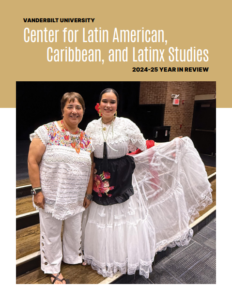CLACX Year in Review
Latest Issue (2024-2025)
2025 CLACX Year in Review
Director’s Corner
Colegas and Friends,
With Celso Castilho returning from research leave, I will pass back the director’s batutua and return to being an affiliated faculty member of CLACX in 2025-2026. Coincidentally, I’ll become the Interim Chair of the History Department, so I’ll retain the interino tag for another year in a different academic unit. Regardless of where I’m sitting administratively, however, CLACX is where I feel most fully in community so I will still be active and present, doing what I can to help the Center thrive.
It has indeed been a strange, surprise-filled, and (at times) disconcerting year. Many of the things we’re witnessing, like the shrinkage of graduate programs, the political targeting of scholarly institutions, a further shrinkage of the academic job market, and dramatic cuts in research funding have their roots in previous years, but they have taken on new immanence. Simultaneously recent books that I have been reading to prepare for teaching in the fall of 2025 already seem like they need to be revised to address new political realities. Uncertainty is the watchword of the moment. We just can’t see what
awaits Vanderbilt and CLACX yet. Nonetheless, I’m a firm believer that the best course is always to turn towards challenges and seek creative ways to embrace change. Another way to think about this is that unexpected shifts can stimulate new scholarly interpretations and offer us new topics and themes to enliven the classroom.
For all the talk of transitions, however, CLACX simply kept doing good work. It is impossible to offer a comprehensive list here, but some highlights for me were Viri Ríos and Tony Wood’s discussion of Mexican elections and politics
in October, The Simon Collier Graduate Student presentations of Guilherme Fasolin and Jean-Paul Rojas in January, Caribbean Week in March, and Lauren Heidbrink’s Latinidades talk in April. Our outreach efforts continued to flourish
with collaborations with the Frist Museum, InDigital V (Indigenous Media in the Americas), the Educator Book Club and Metro Nashville Public Schools. We have also deepened our connections with Latinx undergraduates and their organizations, supporting Baile Folklórico, the Night Market, and hosting student talking circles at the Center.
CLACX has also seen a pair of its stalwarts retire this academic year, Paula Covington and Marshall Eakin. This was particularly poignant for me because I met them when I came to Vanderbilt as a Latin American Studies graduate
student in 1996. They have been valued mentors, friends, and colleagues ever since.
But I think amid the worries and looming uncertainties that unfolded this last academic year, two CLACX events that really spoke to me were our Reunion Reception in November and the Sesquicentennial event in April. In the former, Marshall spoke eloquently about the history of the Center, the important figures in its past, and his own memories at Vanderbilt (see page 8). He stressed how lucky he was to land at Vanderbilt and how he enjoyed a varied and purposeful career here working alongside other faculty and staff. At the latter gathering, we dove still more deeply into the history of the Center. In both events, the message emerged that people, policies, and initiatives evolve. Change happens and sometimes activities that were once central cease altogether. The priorities of administrators, faculty, and students shift, and the winds of funding may drive endeavors for a time before subsiding. The Center, in other words, has had many different names over the years, and its mission has been revamped and refocused at various junctures. There have been lean and quiet times,
and periods of growth and greater activity. But the center endures regardless, and periodically new people come
together to infuse our research, teaching, and events with renewed dynamism.
In sum, five or ten years from now we may look back on 2025 as a turning point the CLACX’s history, but we’ve turned
before. The key is to keep learning and seeking new ways to bring Latin America, the Caribbean, and Latinx Studies to
life. Let’s get to work!
Hasta pronto,
Edward Wright-Ríos, Interim Director
Past Issues
